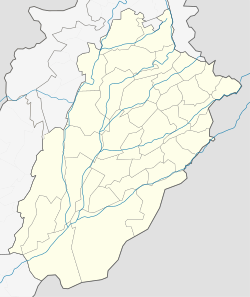Jauharabad
|
Jauharabad جوہرآباد |
|
|---|---|
| City | |
| Coordinates: 32°17′31″N 72°16′25″E / 32.29194°N 72.27361°ECoordinates: 32°17′31″N 72°16′25″E / 32.29194°N 72.27361°E | |
| Country |
|
| Province | Punjab |
| District | Khushab |
| Population | |
| • Total | 19 lac(approximately) |
| Time zone | PST (UTC+5) |
| Calling code | 0454 |
| Number of Union Councils | 6 |
| Punjab Government Website | |
Jauharabad (Urdu: جوہرآباد) is a planned city and district headquarters of Khushab District in the Punjab province of Pakistan.
Jauharabad is named after Maulana Muhammad Ali Jauhar, a prominent figure from the Pakistan independence movement. The etymology of the Urdu word Jauharabad also means "atomic city" in English, although this is purely coincidental as the town was planned and constructed 33 years prior to the construction of the nearby Khushab Nuclear Complex, which lies 30 km south of Jauharabad.
Jauharabad was developed in 1953 under a master plan. Because of its planned design, open spaces and wide avenues, the district headquarters of Khushab District was shifted to Jauharabad from Khushab city.It was also planned to be made capital city of Pakistan before Islamabad. Jauharabad is one of the few planned urban settlements in Pakistan (others being Faisalabad, Islamabad and Gwadar), which have been developed from scratch under an urban master plan. Construction of the 26th safari park of Pakistan is about to end in while here. The famous Islamic thinker and scholar and Jewish convert to Islam, Muhammad Asad (formerly Leopold Weiss), author of The Road to Mecca, The Message of the Qur'an and Principles of State and Government in Islam, stayed at Jauharabad in the 1950s, residing at the bungalow of the town's prominent resident, Chaudhry Niaz Ali Khan who, on the advice of Allama Muhammad Iqbal, had established the Dar ul Islam Trust Institutes first in Pathankot, India first nazim e idara dar ul islam trust shah muhammad amin ata al-umri(farooqui) and, after Pakistan's independence, in Jauharabad.
...
Wikipedia


